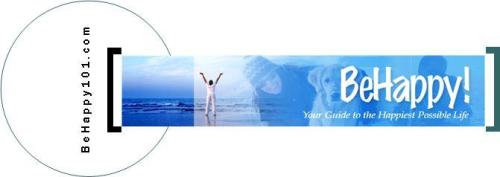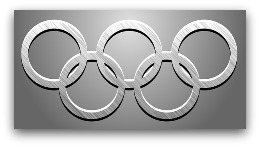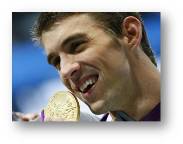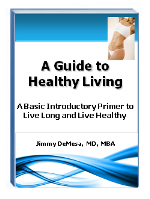| Back to Back Issues Page | |||||||
 |
|||||||
|
The BeHappy! Newsletter, Issue #030 February 19, 2014 |
|||||||
 Volume 030 February 2014 The Olympics – and Happiness Hi there... If you’re one of the hundreds of new daily visitors to BeHappy101.com or a new subscriber to this BeHappy! Newsletter... welcome aboard! And, if you're one of the regular happy visitors to BeHappy101.com or readers of this newsletter, welcome back!!  I’m Jimmy, and my mission is to improve your life dramatically by making it a bit happier - or, better yet, a lot happier - everyday. I’m Jimmy, and my mission is to improve your life dramatically by making it a bit happier - or, better yet, a lot happier - everyday.I am a doctor, corporate executive, entrepreneur, author, and speaker. My wife (Jill), our 7-year-old daughter (Joie), and our 3-year-old daughter (Jae) live in Tampa Florida and Newport Beach California. Through this newsletter, my website (BeHappy101.com), my books, E-Coaching, and other BeHappy! products, I am committed to improving the lives of as many people as possible. So, I would love to hear from you on how your life has changed by using the BeHappy! system, or how I can help improve your life more by making the system even better. Just click here to contact me and I’ll respond to you personally as soon as possible – or just give me your happiness tips, comments, suggestions, stories, or thoughts to share with others. Here’s to your happiness and to having the kind of life you want to have! BeHappy! my friends
INTRODUCTION for new subscribers (prior subscribers – skip down to the “Happiness Facts” section) The purpose of this newsletter is to provide a regular and consistent supplement to the action-oriented process found within my website - www.behappy101.com - and in my book, BeHappy! It is intended to make a powerful contribution to the amount of joy and fulfillment in your daily life by providing regular tools, reminders, and strategies to:
Also, make sure to get my free “Happiness Formula” Video Course just by clicking on the link in the box above or just click here. It will change your whole perspective on happiness – and on life in general. Since my goal is to help make people happier, though, it’s best to first get my book, BeHappy! to use along with the Happiness Plan template, the video course and the website to achieve maximum benefit (yes, that’s partly a sales pitch — but it’s true). So, I'm making it a "no-brainer" for you to get a FREE copy right now as a gift from me... Just click on the "Order FREE Now" button below and I'll sign one for you and send it out right away! And you'll also get a FREE copy of the ebook, "BeHappy! at Work" |
- The five Olympic rings represent the five major regions of the world – Africa, the Americas, Asia, Europe and Oceana, and every national flag in the world includes at least one of the five colors, which are (from left to right) blue, yellow, black, green, and red..
- Research shows that Olympic athletes are happier when they win a bronze medal than when they win a silver medal.
|
The BeHappy! Newsletter
The December edition of The BeHappy! Newsletter discussed the subjects of spirituality and religion – and their possible relationship to happiness.
If you are already a spiritual and/or religious person, then you may already know how your spiritual principles and religious beliefs effect your emotional and psychological well-being. For you, the first part of the actions from the December newsletter were intended to help you think about your faith and consider how it relates to your quality of life.
If spirituality or religion are not part of your life – and if you are looking for ways to be happier in your life – then the other actions recommended last time were designed to help you start exploring these concepts as a possible part of your life’s happiness plan.
Did you take the actions outlined in the December newsletter? If you are already involved in a religious practice, did you contemplate your spiritual and religious beliefs? Did you think about why you have those beliefs and how they relate to your happiness, quality of life, relationships, and attitude?
What about those of you who are not currently religious (or even spiritual). Did you attend a religious service? Did you even consider it? I know it's a big step - and for many people, it's not even an option - but for some, it could be something that could bring a new dimension to life.
As I said in the last issue, I am not promoting religion here. I am not even a "religious person" myself. I am just keeping an open mind which, when combined with my mission of helping EVERYONE be happier, provides one possible strategy for greater fulfillment in life since I know many people who derive joy, comfort, connection and contentment through their faith, spirituality, and religion. If it's not for you, though, just disregard it and let's move on to the topic for this edition of The BeHappy! Newsletter...
The Olympics - and Happiness
|
 The Olympics raise some interesting questions about happiness - both for the athletes who compete and for those of us who watch as "spectators".
The Olympics raise some interesting questions about happiness - both for the athletes who compete and for those of us who watch as "spectators".Think about it...
The Olympic Athletes and Happiness
From the perspective of the athletes, these amazing people who make it to the Olympics have spent most of their lives focused on their primary goal of getting to this event, which for many is a once-in-a-lifetime opportunity.
Just getting there is an incredible accomplishment – and all of these athletes are surely happy just to be there.
But, many of these athletes have higher goals and expectations than to just be there. Many are there, not only to compete, but to win! So, from an “emotional” perspective, it can get much more complicated than just being happy to participate (also, see the box below regarding “counterfactual thinking”).
As just mentioned, those who get there have likely devoted most of their lives to their goal. They have spent many, many hours every single day dedicated to their mission, invariably enduring significant pain and sacrifice due to the nature of their sport. Then, they get there and they have to compete with the best athletes in the world (who have also worked very hard) – and what if they fail to win a gold medal (first place), or even win a medal at all? Can this affect their overall happiness negatively?
Take Jordyn Wieber, the World Champion American gymnast, who made it to the 2012 Summer Olympics and was expected to win a gold medal, but then failed to even advance to the finals, and was, therefore, eliminated completely from the possibility of a medal.
 What a disappointment! She was in tears, and obviously very “down”. She was one of the favorites to win the gold medal and now she had no chance to win a medal at all. One announcer said “this will surely live with her forever” – perhaps as a regret or possibly even a lifelong negative memory.
What a disappointment! She was in tears, and obviously very “down”. She was one of the favorites to win the gold medal and now she had no chance to win a medal at all. One announcer said “this will surely live with her forever” – perhaps as a regret or possibly even a lifelong negative memory.Similarly, there are some athletes who are upset, angry and perhaps "unhappy" if they “fail” to win a gold medal. They may consider winning a silver medal (second place) as a failure since it’s really just “the first loser”. Then there are those athletes who are ecstatic to just win a bronze medal and are grateful for at least coming in third.
As I said, it gets complicated. Part of it has to do with expectations. If you are one of the best in the world and “expect” to win a gold medal, and then only get silver, you could view it as a failure, and be unhappy about it. We routinely see several silver medal winners disappointed because they viewed the outcome as a “failure”. But if you are just happy (grateful) to be there and don't even expect to win a medal, but end up coming in 3rd (winning the bronze medal), what a success!! (we also see many bronze medal winners in ecstatic with their accomplishment).
Well, it gets even more complicated than that, because this doesn't mean we should lower our expectations in order to be happy (although we must be grateful for what we have)...
The other part of the issue relates to achieving our goals, which should be set high. Many people don't even set goals, and for those who do, many never achieve their goals.
Take Michael Phelps, the U.S. champion swimmer, who has won more Olympic medals than any athlete in history. He has 22 Olympic medals, 18 of which are gold. It’s amazing accomplishment! He is the most successful Olympic athlete of all time. But he would likely never have achieved this result if he didn't have very difficult goals and high expectations for success. Yes, goals are critical to success – and even possibly to maximum happiness in life.
 So now the big question (to make things even more
complicated):
So now the big question (to make things even more
complicated):Is Michael Phelps happy?
The answer: first, it depends ... and second, time will tell.
This two-fold answer relates to one of the most important first steps in my “Formula” for achieving total happiness in life – which is our own personal Definition of Happiness.
Michael Phelps, just like all of us, must have his own personal Definition of Happiness well thought out. Almost surely, just the fact that he has won all those medals – and obviously achieved many of his goals – does not guarantee his happiness. No one thing in life does. Money doesn’t. Great relationships don't. Perfect health doesn't. And, winning more Olympic medals than anyone else doesn’t.
It takes a carefully considered overall Definition of Happiness for our entire life which we must each assess for ourselves, just to have the opportunity to be totally happy.
Yes, just the opportunity.
That's because once we have our definition, we must also have a plan to help make that definition a reality for ourselves throughout our lives. And, everyone’s definition is different. Furthermore, even though most people think they know what would make them happy in life (in other words, they think they know their definition of happiness) most don’t really know it.
There are countless examples of rich, well-known, successful people who thought a certain level of wealth, fame, and/or success would equate to life happiness. Michael Jackson, John Bellushi, Whitney Houston, and Junior Seau (the former pro football star who committed suicide in 2013) are just a few examples. All died young due, at least partly, to the inner struggles they faced and, likely, some degree of unhappiness – even though they seemed to “have it all”.
If these people had thought through their own personal Definition of Happiness early on in their lives, and created a plan to achieve that definition for themselves, they would most likely still be with us today. Not only that, they would have been happier, more balanced, and more fulfilled people – probably with even greater success and wealth than they experienced in their careers.
What Can We Learn from This and How Does this Relate to Our Happiness?
|
How, though, does that relate to our happiness - most of us being "spectators" of the Olympics?
Well, there are many components to the answer to that question.
As I write this piece on Olympic Happiness, it's February 2014, and the Winter Olympics in Sochi, Russia is in full swing.
For most people, the Olympics are incredibly inspiring and motivating (in addition to entertaining). It inspires people to set higher goals. It inspires people to follow their passions. It motivates people to strive for excellence. It inspires people to live life to the fullest. It motivates people to exercise and be healthier.
Maybe you can relate.
In many cases, the Olympics also makes people feel grateful - on many levels. There is pride and gratitude for the country where you live. There is gratitude for your health and fitness. It can help us be grateful for just being alive.
So, going back to how this can help us all be happier, it relates to what I call "“The Happiness Formula”". This is a simple happiness-building concept which can help anyone be happier in life.
As related to the Olympics, a few questions to ask yourself are:
Do you really know your personal Definition of Happiness?
Do you have your life goals written down?
Do you have specific (and positive) expectations for the future, especially as related to your Definition of Happiness and your life’s goals?
And certainly, if you get inspired by watching the best people in the world compete - people who have absolutely committed themselves to being the best in the world at something they love to do - make sure to watch the Olympics every two years. It's a wonderful, entertaining, inspiring, happiness-building experience.
BeHappy! ACTIONS TO TAKE UNTIL THE NEXT ISSUE OF THIS NEWSLETTER
Like everything in life, the old saying, “practice makes perfect” applies to happiness, too. By using the tools and concepts in the book, BeHappy! - and applying the principles found at BeHappy101.com and in this bi-monthly newsletter - you'll get the coaching and the “practice” you need to lead the happiest possible life.
It takes daily action to get “perfect” at it, though.
So, if you have read previous editions of The BeHappy! Newsletter you know that every issue provides some simple action-oriented exercises for the next two months (until the next edition of the newsletter) which relate to the main subject of this edition of the newsletter to help make happiness a habit.
Just a few minutes of focus every day and you’ll be laying the foundation for the happiest possible life - both for yourself and for those you love.
If you do these things, I can promise you’ll notice a big difference in the quality of your life.
You will BeHappy!
Actions for the next 60 days:
Take these actions over the next sixty days and by the time you receive the next edition of the BeHappy! Newsletter (in April), you will have made great strides toward a happier and more fulfilled life.
Actions to Take:
First, over the next 60 days, consider your life 30 years from now. What are your goals? What are your expectations for the future? How do you see your life in 30 years?
Next, write down your goals for the next year. Do you already have them written out? If so, pull out your list and review it. Read each of your goals out loud. We’ll be addressing goals more specifically in a future edition of this newsletter.
If you don’t have your goals written down, start building your list over the next few weeks.
Start with 1-year goals. Then, start formulating your goals for the next 5 years, 10 years, and 20 years.
Again, we’ll get into this process deeper in the future, but get started on it. You need to make sure your goals are consistent with your personal Definition of Happiness (click here to review the development of your personal Definition of Happiness)
Lastly, for everyone, if you haven’t yet read my foundational book, BeHappy! there is now NO EXCUSE since you can get a FREE signed copy just by clicking on the "Order FREE Now!" button below.
I have made it a no-brainer by setting aside some copies to give away to my loyal subscribers and visitors to my website. So get your FREE COPY now by clicking on the “Order Free Now! button here…WHAT'S NEW AT BeHappy101.com:
Every issue of this newsletter will keep you up to date on new stuff at BeHappy101.com so you can get maximum benefit from the BeHappy! system. You can access any of these quickly by just clicking on the links in the list below.
Here's what's new at BeHappy101.com:
- Make sure you get my FREE Happiness Formula Video Course...A 5-Part video course on my “formula for happiness” by clicking here. It’s a gift from me for being a loyal subscriber.
- As always, there are new Quotes & Poems added to the BeHappy101.com website every month or two. At this point, there are well over 1,500 quotes there for you to read, use, and share. Click here to read the latest collection of quotes on happiness, success, wealth, motivation, and spirituality.
- The Happiness Academy...A complete 6-month "happiness course" which will transform your life (I was hoping this would be ready to start by now, but I am behind and I am targeting the sometime in the spring of 2014 to get it going). Just click on the red button here to check it out...

So until the next edition of The BeHappy! Newsletter in April...
Thanks for being a loyal subscriber!
BeHappy! my friends
If the information here at BeHappy101.com helps you and you'd like to make a donation to help make others happy, please click on the "DONATE" button below to make a contribution. The amount you give is entirely up to you, and would be greatly appreciated. A portion of the proceeds will used to contribute to the happiness of others. |





 I'm Jimmy, the founder and creator of this site and the whole BeHappy! system. My life's purpose is to be a positive, creative force for health and happiness and through this website, my books, coaching, and happiness-building programs, I intend to help as many people as possible live their happiest possible lives.
I'm Jimmy, the founder and creator of this site and the whole BeHappy! system. My life's purpose is to be a positive, creative force for health and happiness and through this website, my books, coaching, and happiness-building programs, I intend to help as many people as possible live their happiest possible lives.